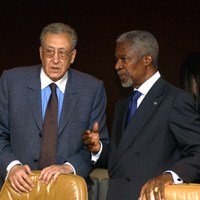It is an absolute certainty that 2014 will be a turbulent year for the United Nations. The organization is struggling with crises ranging from the chaos in the Central African Republic (CAR) to the plight of Syrian refugees. There is little hope that these challenges will dissipate soon. Yet two sets of peace talks this month could well decide whether the U.N. faces a truly dreadful year ahead, or just a very difficult one.
The first is already underway in Addis Ababa, where emissaries of the South Sudanese government and its opponents may or may not manage to reverse their young state’s collapse into violence. The second will be in Switzerland, where representatives of Syria’s regime and rebels are meant to convene in Montreux and Geneva starting on Jan. 22. Although the Addis Ababa negotiations are being overseen by East African governments, the U.N.’s credibility is at stake in both processes. The South Sudan talks will shape the future of the peacekeeping force in the country, UNMISS, while the Syrian discussions are the long-delayed culmination of U.N.-Arab League envoy Lakhdar Brahimi’s attempts to revitalize the peace process begun by his predecessor, Kofi Annan, in 2012.
The U.N.’s roles in South Sudan and Syria are obviously very different, with an emphasis on military peacekeeping and humanitarian aid in the former and quiet diplomacy in the latter. But the cases have two important characteristics in common. First, they are both of significance to the United States. Second, the Obama administration has invested in giving the U.N. a prominent role in managing both. The outcomes of this month’s pair of talks will affect not only the U.N.’s standing but Washington’s too.

